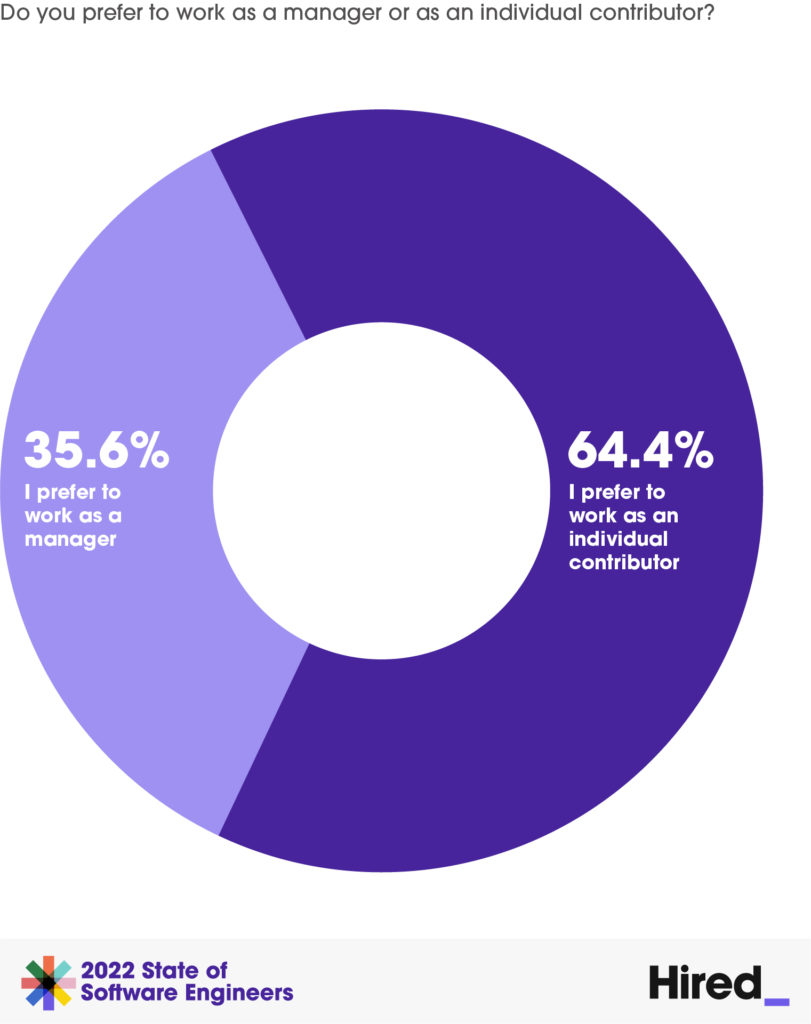
Engineering Manager or IC? Which Tech Career is Best for Me? (Video)
Have you ever wondered whether to follow an Individual Contributor (IC) path or an Engineering Manager (EM)? According to the Hired State of Software Engineers report, one-third of engineers report they want to advance to become managers, while the remainder says they want to continue being ICs.

What are the pros and cons of the Engineering Manager career path versus the Individual Contributor one? Let’s find out!
Hired, along with our partner Exponent, recently completed a video series to explore engineering career advice. The series featured three of our talented engineers: Nico Thiebaut, Prakash Patel, and Dan Baker, discussing subjects such as:
In this article, we recap Exponent’s conversation with Prakash Patel. Prakash is an Engineering Manager at Hired, a tech marketplace that matches talent with employers for roles around the world. He followed his passion for data engineering and solving complex data problems, spending two years as an Individual Contributor and one year as an Engineering Manager.
Although Engineering Managers currently command the highest salaries across all technology roles on Hired’s platform conventional wisdom says,
You should not become an Engineering Manager if you…
- Want dedicated time to work on specific projects or hone in on programming skills
- Are uncomfortable managing team dynamics
- Prefer to own your own code
- Want to quickly build new technical skills
- Would rather your success be measured by your individual contributions.
Here’s a quick summary of the conversation between Prakash Patel and Lucas from Exponent. To watch or listen to the full interview, scroll down to the bottom of the article.
Engineering Managers often don’t get dedicated time to work on a specific project or hone their programming skills. What is your experience with the flip side of this: being focused on supporting your team and making them successful?Based on my time as an IC, I understand the pain points and problems my team faces and will face since I have already experienced it. Engineering Managers are responsible for the smooth execution of projects while minimizing the concerns that arise.
There are different phases of projects but every phase has a challenge. As an Engineering Manager, I support my team to succeed while minimizing all those concerns. I enjoy focusing on the vision of the company and blending it with the personal and professional growth of ICs.
As an Engineering Manager, you’re working with an entire team’s dynamics, meaning you need to resolve conflicts when they arise. What do you think the upside is to managing the dynamics of a team?Conflicts are inevitable and as an EM, the more you handle them the better you’ll get. One upside is you help all Individual Contributors on the team succeed. Another upside is eventually you get better at saying no.
There will be so many things to control as an EM. By managing these dynamics, I see I am helpIng my engineers wholly – both in their technical competence and project management abilities.
As an Individual Contributor, your code contributed to the codebase and you could point to what you owned. In your role as a manager, how does your involvement with the codebase change, and how does this impact your team’s work?Well, as an EM I don’t get a lot of opportunities to actively maintain the codebase but I do participate in the code reviews. I can always suggest ways to improve the tech stack and that’s where I help my team adjust the roadmap. WhIle I am not maintaining the codebase, I am motivating my team to participate in constructive code-based reviews to help make them better engineers.
Insight from Exponent
Your experience as an Individual Contributor helps here as you’ve developed the technical know-how and understand how to grow from progress from a junior to senior engineer in terms of coding ability.
Related: Curious about tech salary trends? Check out the data in this review.
As an EM, you’ll develop tech skills more slowly. You’ll be focused more on macro than learning new languages or libraries. What kind of skills do you build as an Engineering Manager?As an EM I developed a “think big” and “make it happen” attitude. On top of that, I learned to give constructive feedback and how to negotiate.
When you’re an Engineering Manager, your team’s success determines your success. It can take longer to ship products and code. How is success measured as an EM, and what do you find fulfilling about it?My success is measured by the performance of my team and my individual reports. My goal is to develop technical excellence across the company as an EM. I enjoy driving project execution but I make sure my individual reports receive exciting, diverse responsibilities in a way that infuses the company’s culture with our team.
If you’re not sure whether to pursue an IC path or transition into an EM, here’s my advice: if you’re even a little interested in becoming an EM, talk about it with your manager. Ask them to provide more responsibilities that will help you become an EM.
From there, you can evaluate whether you enjoy the work and if that role feels like the right fit. If so, request more tasks. If you progress, you can eventually transition into an Engineering Manager role.
Ultimately, the two paths are very different experiences so it’s all about what you enjoy.
How to use Hired to find Engineering Management rolesHired is completely free for jobseekers and it takes just minutes to create a profile. Once you upload your information, you’ll get interview requests from companies seeking talented candidates like you! Learn more about creating your Hired profile.
Already have a profile on Hired? Here are 5 Key Tips to Get Better Matches & More Interviews.
Should you switch to an Engineering Manager role internally or seek out an EM role when looking for a new job?Transitioning within a company is a better and easier decision, especially since you are already familiar with your team. On the other hand, if you are an Individual Contributor seeking a job as an EM at a different company and you do not have that proven experience, it’s harder to make the jump.
Eager to pursue a role as an Individual Contributor or Engineering Manager? Learn how Hired works for jobseekers! Are you hiring for Individual Contributor or Engineering Manager roles? Find active, talented tech on Hired.Click below to watch the full interview:
Related blog posts

What are the Best Programming Languages to Get a Software Developer Job? (Video)
Hired & Exponent partner for engineering career advice video series Hired, along with our...

How to Become a Machine Learning Engineer
Hired & Exponent Partner for Engineering Career Advice Video Series Hired recently...

Interested in a Tech Role? Here’s Your Resume Guide
Ready to Land your Dream Job? It Starts with the Right Tech Resume Believe it or not –...

Tech Candidate Spotlight – Graham Hensley, Senior Engineering Manager
Hi Graham! Can you tell us about your educational background? I got a traditional degree...

How to Maximize Your Job Offer as a Remote Engineer
This article is reposted from one originally contributed to LeadDev.com and authored by Lawrence...
